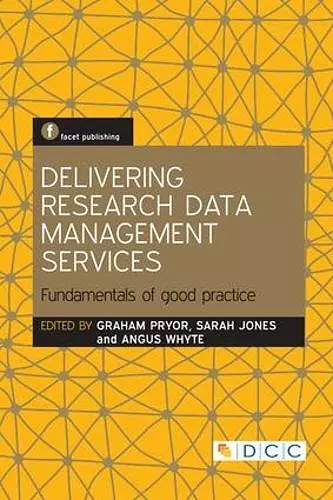Delivering Research Data Management Services
Fundamentals of Good Practice
Angus Whyte editor Sarah Jones editor Graham Pryor editor
Format:Hardback
Publisher:Facet Publishing
Published:29th Sep '17
Currently unavailable, and unfortunately no date known when it will be back
This hardback is available in another edition too:
- Paperback£75.00(9781856049337)

Step-by-step guidance to setting up and running effective institutional research data management services to support researchers and networks.
The research landscape is changing, with key global research funders now requiring institutions to demonstrate how they will preserve and share research data. However, the practice of structured research data management is very new, and the construction of services remains experimental and in need of models and standards of approach. This groundbreaking guide will lead researchers, institutions and policy makers through the processes needed to set up and run effective institutional research data management services.
This ‘how to’ guide provides a step-by-step explanation of the components for an institutional service. Case studies from the newly emerging service infrastructures in the UK, USA and Australia draw out the lessons learnt. Different approaches are highlighted and compared; for example, a researcher-focused strategy from Australia is contrasted with a national, top-down approach, and a national research data management service is discussed as an alternative to institutional services.
Key topics covered:
- Research data provision
- Options and approaches to research data management service provision
- A spectrum of roles, responsibilities and competences
- A pathway to sustainable research data services: from scoping to sustainability
- The range and components of RDM infrastructure and services.
Case studies:
- Johns Hopkins University
- University of Southampton
- Monash University
- The UK Data Service
- Jisc Managing Research Data programmes.
Readership: This book will be an invaluable guide to those entering a new and untried enterprise. It will be particularly relevant to heads of libraries, information technology managers, research support office staff and research directors planning for these types of services. It will also be of interest to researchers, funders and policy makers as a reference tool for understanding how shifts in policy will have a range of ramifications within institutions. Library and information science students will find it an informative window on an emerging area of practice.
I feel the book is particularly relevant to professional support service staff who now find RDM is part of their remit. Viewed as a whole book, it is a comprehensive guide to the drivers of change, the components of building and executing a policy and implementing an RDM infrastructure, but will also act as a reference text, to look up specific areas of guidance and examples or be signposted toward resources.
-- Records Management JournalI have to admit from the outset that when I was invited to review Delivering Research Data Management Services: Fundamentals of good practice by Pryor, Jones, and White, I was concerned that I may not be able to write a useful review for librarians looking for a source that would help them in the implementation of research data management (RDM) services. My concerns, however, were allayed after reading the first chapter of the book. I realized that this book was one that librarians can learn from, use, and adapt...the book is presented in a straightforward and scholarly manner without the overuse of jargon.
-- Journal of Electronic Resources LibrarianshipThis is a book which resonated strongly with me. It advocates for a culture change in data practices; a sustainable, holistic approach to research data management, from policies to planning, to storing and sharing as appropriate, and cautions against being driven by compliance with single funder requirements. Yet it also addresses the importance of sharing data for research impact, integrity and economics. It is neatly split into two: the different approaches and elements of service provision, and case studies. The editors write the bulk of the text; the first five chapters provide an introduction and overview of elements of research data management services, challenges and issues associated with a philosophical shift to the sharing of data from traditionally private storage, to data communication and requirements for data infrastructure. The current gap between researcher requirements and currently available services is also noted, justifying this book as a guide to developing services.
-- Australian Academic & Research LibraISBN: 9781783303076
Dimensions: 237mm x 232mm x 19mm
Weight: 235g
256 pages